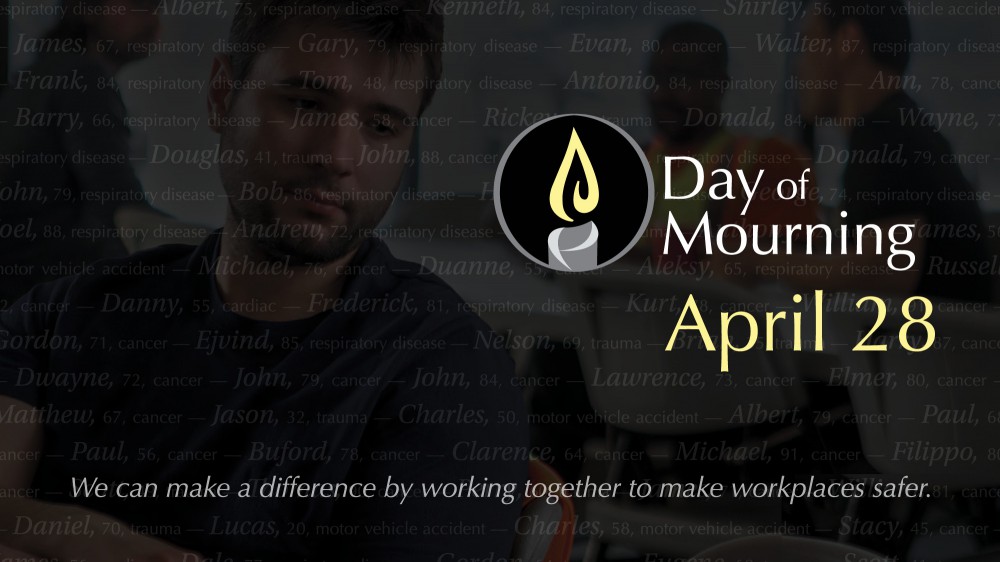
One is too many. This is the theme United Nurses of Alberta will be emphasizing on Sunday, April 28, 2019, the National Day of Mourning.
The National Day of Mourning has been observed on April 28 in Canada since 1991, a year after passage of the Workers Mourning Day Act by Parliament. It commemorates working people who have been killed, injured or suffered illness from workplace hazards and occupational exposures.
At UNA, we realize that health care is different from most occupations when it comes to protecting workers from the dangers of their work. This is because in addition to expected workplace hazards, nurses’ work requires a high degree of physical work with patients.
When people enter the health care system, they naturally experience fears and emotions, as do their friends and members of their families. Many of us feel we have lost control when we or a loved one is in a health care facility. This can lead to emotionally charged reactions and, sometimes, the potential for violence.
This helps explain why injuries to health care workers are so high compared to most other occupations. Health care workers’ lost-time claims and no-lost-time claims accepted by the Alberta Workers’ Compensation Board have been increasing. And all categories of injury – exposures, musculoskeletal injuries, slips, trips, falls, and workplace violence – increased in the health care sector between 2015 and 2017.
We know from analysis of 2017 Workers Compensation Board statistics that workers in the predominantly female health care sub-sector have the highest rate of accepted workplace violence claims. The WCB statistics indicate that health care workers are 70 times more likely to have an accepted WCB claim resulting from violence than the rate of violence-related claims in the predominantly male mining, manufacturing and construction sector.
So, what does One is to Many mean when there are so many injuries occurring?
Health care workers are now getting the message their injuries need to be reported. The increase in injury reporting has been shown through employer tracking systems. Only by reporting injuries can we as a workforce ensure changes in workplace practices occur that lower injury rates.
There has also been increase in reports to UNA of weapons use, violence and sexual assaults.
Meanwhile, research by the Canadian Federation of Nurses Unions sin 2017 suggested that 70 to 80 per cent of all violence faced by nurses is never reported. In a discussion paper entitled Enough is Enough, CFNU explained the higher risk of violence by pointing to short staffing, inappropriate placement of patients, inadequate security or inability to access security, lack of secure rooms for patients in emergency departments, lack of mental health beds at designated facilities, and inadequate communications protocols and practices.
At last year’s Day of Mourning ceremony in Edmonton, UNA, the Health Sciences Association of Alberta and the Alberta Union of Provincial Employees together called for an end to violence in health care. UNA President Heather Smith said security must be on site at every urgent care centre in Alberta.
Alberta Health Services has responded by hiring more security in some urgent care centres and placing more mobile security units in rural Alberta. This has led to more sites being able to access security assistance to deal with aggressive patients. Nevertheless, many areas remain that do not have access to timely security. More must be done to ensure safe workplaces for UNA’s members and other health care workers.
When one of our members is injured because the access to security is not timely, that is one too many.
Every time one of our members is injured because of faulty equipment, short staffing, or unsafe working conditions, that is one too many.
UNA calls on each of you to reflect on the dangers of your job on this Day of Mourning and remember you are an important person. UNA does not want you to be a statistic we mourn next year on April 28. When you go to work, work safe – your partner, your spouse, your children and family all want you to come home safe and uninjured.